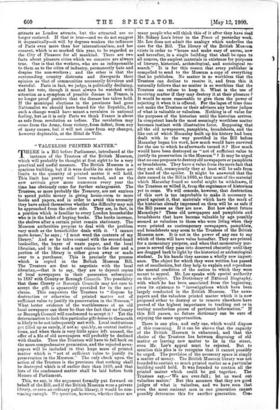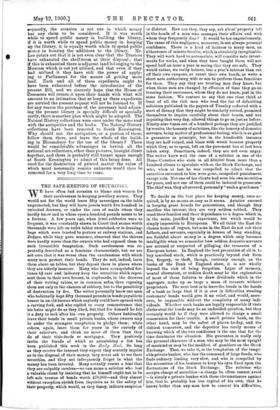" VALUELESS PRINTED MATTER."
THERE is a Bill before Parliament, introduced at the instance of the Trustees of the British Museum, which will probably be thought at first sight.to be a very practical and useful measure. The British Museum is a spacious building, but if it were double its size there are limits to the quantity of printed matter it will hold. This limit has pretty well been reached, and as the new arrivals grow more numerous every year the time has obviously come for further enlargement. The Trustees, or more probably the Treasury, are not anxious to spend public money in giving house-room to more books and papers, and in order to avoid this necessity they have asked themselves whether the difficulty may not be approached from the other side. They are, in fact, in a position which is familiar to every London householder who is in the habit of buying books. The books increase, the shelves after a certain point remain stationary. The Museum authorities propose to deal with the problem very much as the householder deals with it. I cannot move house,' he says ; I must weed the contents of my library.' And so he takes counsel with the second-hand bookseller, the buyer of waste paper, and the local librarian, and in the end a cart comes to the door and a portion of the library is either given away or made over to a purchaser. This is precisely the process which is copied in the British Museum Bill. The Trustees are first to negotiate with the local librarian,—that is to say, they are to deposit copies of local newspapers in their possession subsequent to 1837 with County or Borough Councils. The possibility that these County or Borough Councils may not care to accept the gift is apparently provided for in the next clause. This empowers the Trustees to " dispose by destruction or otherwise of printed matter not of sufficient value to justify its preservation in the Museum." What better evidence of the worthlessness of an old local newspaper can there be than the fact that no County or Borough Council will condescend to accept it ? Yet the determination to look this particular gift-horse in the mouth is likely to be not infrequently met with. Local institutions get filled up as surely, if not as quickly, as central institu- tions, and when there is very little space left unused, the offer of a file of old newspapers will probably be declined with thanks. Then the Trustees will have to fall back on the more comprehensive permission, and the rejected news- papers will be included in that huge mass of printed matter which is "not of sufficient value to justify its preservation in the Museum.' The only check upon- the action of the Trustees is the provision that nothing shall be destroyed which is of earlier date than 1660, and that lists of the condemned matter shall be laid before both Houses of Parliament.
This, we say, is the argument formally put forward on behalf of the Bill, and if the British Museum were a private library, or even an ordinary public library, it would be con- vincing enough. We question, however, whether there are many people who will think this of it after they have !lead Mr. Sidney Lee's letter in the Times of yesterday week. Mr. Lee does not admit the analogy which underlies the case for the Bill. The library of the British Museum exists in order to "house and make easy of access, now and hereafter, in a single building that shall be open to all corners, the amplest materials in existence for purposes of literary, historical, archaeological, and sociological re- search." It is for this reason that every publisher is compelled to send to the Museum a copy of everything that he publishes. No matter is so worthless that the Trustees can decline to receive it, and from this it naturally follows that no matter is so worthless that the Trustees can refuse to keep it. What is the use of receiving matter if they may destroy it at their pleasure ? It would be more reasonable to give them the power of rejecting it when it is offered. For the lapse of time does not make the Trustees or their advisers any better judges of what is valuable or valueless. Nothing is of value for the purposes of the historian until the historian arrives. In competent hands the most seemingly worthless matter becomes instinct with illustrative force. Supposing that all the old newspapers, pamphlets, broadsheets, and the like out of which Macaulay built up his history had been dealt with in the way provided in the Bill before Macaulay began his work, how much would have survived for the use to which he afterwards turned it ? How much would have been destroyed as " not of sufficient value to justify its preservation in the Museum " ? It may be urged that no one proposes to destroy old newspapers or pamphlets or broadsheets. They have a value from the mere fact that they are old, consequently they at least will be safe from the hand of the spoiler. It might be answered that the date named in the Bill is 1660, so that most of the material which Macaulay found so useful might be withdrawn, if the Trustees so willed it, from the cognisance of historians yet to come. We will concede, however, that destruction of this sort is to improbable to make it necessary to guard against it, that materials which have the mark of the historian already impressed on them will be as safe if the Bill passes as they are now. But how about future Macaulays ? These old newspapers and pamphlets and broadsheets that have become valuable by age possibly seemed as valueless to those who were living when they were printed as contemporary newspapers, pamphlets, and broadsheets may seem to the Trustees of the British Museum now. It is not in the power of any one to say which of them will have value hereafter. They are printed for a momentary purpose, and when that momentary pur- pose is served they pass into deserved obscurity until they are dragged back to light by the historical or archaeological student. In his hands they assume a wholly new import- ance. The object for which they were written has passed out of recollection, but they help to explain and reproduce the mental condition of the nation to which they were meant to appeal. Mr. Lee speaks with special authority on this subject. The Dictionary of National Biography, with which he has been associated from the beginning, owes its existence to " investigations which have been largely conducted in the British Museum. The news- papers and the valueless printed matter which it is now proposed either to destroy or to remove elsewhere have proved of the highest importance in tracking out or in testing numberless pieces of pertinent information." If this Bill passes, no future dictionary can be sure of enjoying the same opportunities.
There is one plea, and only one, which would dispose of this reasoning. If it can be shown that the capacity of the British Museum is exhausted, and that the choice of the Trustees lies between disposing of old matter or leaving new matter to lie in the street, even Mr. Lee's appeal must be rejected. But to mention this plea is to recognise that it cannot possibly be urged. The provision of the necessary space is simply a matter of money. The British Museum library was not founded to contain so much printed matter as a particular building could hold. It was founded to contain all the printed matter which could be got together. The Trustees say,—' We are over-full ; let us weed out valueless matter.' But this assumes that they are good judges of what is valueless, and we have seen that even the most eminent men in one generation cannot possibly determine this for another generation. Con- sequently, the occasion is not one in which money has any claim to be considered. If it was worth while to spend public money in building the library, if it is worth while to spend public money in keeping up the library, it is equally worth while to spend public money in housing the additions to the library. Mr. Lee points out that it is not even clear that the Trustees have exhausted the shelf-room at their disposal ; that if this is exhausted there is adjacent land belonging to the Museum which is not yet utilised, and that even if they had utilised it they have still the power of apply- ing to Parliament for the means of getting more land. Each and all of these expedients ought to have been exhausted before the introduction of the present Bill, and we sincerely hope that the House of Commons will return it upon their hands with what will amount to an intimation that so long as these expedients are untried the present request will not be listened to. If for any reason the purchase of the necessary land adjoin- ing the present library is specially difficult or specially costly, there is another plan which might be adopted. The Natural History collections were once under the same roof with the antiquities and the books. The Natural History collections have been removed to South Kensington. Why should not the antiquities, or a portion of them, follow them there, and leave the whole of the build- ing in Bloomsbury for the use of the library ? There would be considerable advantages in having all the national art collections, other than pictures, brought closer together, and there is probably still vacant space enough at South Kensington to admit of this being done. All need for the destruction of printed matter the value of which most necessarily remain unknown would thus be removed for a very long time to come.







































 Previous page
Previous page